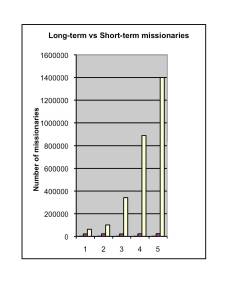We Can’t End Poverty – the problem of aid utopianism
One of the common refrains from some of those involved in global development work is the assertion that if only we try a bit harder, donate a few more pounds and campaign a bit more vigorously then we can end global poverty. It is understandable why such rhetoric is prevalent. “We can end global poverty!” has a bit more power and punch than “We can reduce global poverty a bit – maybe.” Understandably, campaigners don’t want to just ‘amend’ or ‘minimise’ the evil of global injustice, they want to eradicate it. And don’t we all.
But in this posting, I want to suggest four reasons why I think such utopianism is misplaced and why it is actually counterproductive in the fight against global poverty.
- It encourages voluntourism
One of the remarkable phenomena of recent years has been an explosion in short-term missioners (STM). These are people who go overseas for anything from 1 week to a couple of months in order to do some good. While such folk often go with the best of intentions, the literature on their effectiveness is less than convincing. Ver Beek concludes his systematic analysis of a range of studies by saying:
The research outlined above demonstrates that STM as they are currently being practiced, are creating very little lasting positive change in the participants… While the STM trip is often a mountaintop experience for the participants, a few weeks or months later their good intentions to raise money for world missions, work for social justice or deepen their faith have not been translated into actions. If we hope to see those good intentions translated into accomplishments something needs to change.
One of my favourite stories of the ineffectiveness of short-term mission is outlined in a blog by Pippa Biddle. She tells of a trip she made to Tanzania where her group of volunteers “were so bad at the most basic construction work that each night the [local] men had to take down the structurally unsound bricks we had laid and rebuild the structure so that, when we woke up in the morning, we would be unaware of our failure.”
The link between this and utopian dreams of ending poverty is that it’s precisely because the claims to end poverty are so motivational that they inspire large numbers. If what you are told is that there is some unimaginable evil in the world but that the solution to that evil is within your grasp, and all you need to do solve it is give a little more either in time or money, then of course many of us will jump at the chance. Whether or not we actually have the skills to help, whether in reality our well-meaning efforts do more harm than good – these are not factors we consider as, after all, we are ending poverty – except we’re not!
- It generates aid fatigue & scepticism
The second problem with utopian claims about ending poverty is that it generates aid fatigue and scepticism. If you are someone that has been told that ‘we can end poverty’, or that ‘within our generation, poverty can end’ and so on, but then you rapidly realize that actually the problem of poverty is not solved, that millions continue to die unnecessary deaths, that while the problem has possibly been reduced it is far from eradicated then at this point you give up.
I am currently training for my first marathon. It has been a very long slog. I have run in the rain; I have run in the snow. I have run when it was so cold I couldn’t feel my fingers and throughout it all I have kept going. I have done this because at the start I read some books and they all told me that to run a marathon takes a long, slow period of training. It is not something that you decide one week you’re going to do the next. All of this means that when it was hard, when I didn’t feel like it, I have kept on going, precisely because I knew this was what it would be like.
The problem with utopian claims about ending poverty is that when it doesn’t happen, when in reality we fail to solves this global crisis, far too many give up. It’s no accident that surveys consistently show that the older you are the more likely it is that you will have sceptical views towards poverty – believing that it is caused by laziness or lack of will power. It seems to me that part of this age-related scepticism is precisely because in their youth those folks were told that we could end poverty. They also know that in the intervening years, successive governments have given large amounts of money and yet very little has changed. Their inevitable conclusion is that it’s not due to a lack of effort on their part – after all, they were told ending poverty is easy – it must therefore be due to lack of effort on the part of the poor. That is the problem with claims we can end poverty. They fail to prepare people for the long, hard slog that it will be. In the process it creates age-related disillusionment when a greater sense of reality at the start may well have generated fewer supporters, but they would at least have been there for the long haul.
- It encourages a messiah complex in the more economically prosperous parts of the world
Thirdly, it encourages a messiah complex amongst the global rich. We start to believe that we are the solution to the world’s problems instead of recognising that in fact we are the problem. South African Dr Molefe Tsele has written:
Development workers…tend to forget that they are human after all, and that there are some problems that simply are beyond our capacity to solve. We are not the Mr Fix-It of societies’ woes.
He describes the problems that occur when those in the development industry come to believe that they can solve all problems including in particular a failure to really take the time to understand the issue before them. The global south is literally littered with white elephants – equipment left by well-meaning supporters who thought they could solve a problem just by sending over a few crates of materials. Yet in the process, we leave behind our detritus.
Perhaps the best illustration of this messiah complex can be found in the Kenyan mockumentary, The Samaritans, in which a fictional development agency works hard at doing nothing remotely useful. The fact that this programme has come from the global south is telling.
- It detracts from the real change required
Finally, and perhaps the biggest problem with utopianism in respect of global poverty is that it detracts from the real change that is required. As I have argued elsewhere, if we are really going to solve the problem of global poverty, this will not be done by instilling more water pumps, twinning with a few more latrines or cows, or even by vaccinating a few more children – it will only occur if we fundamentally change the way in which our global financial system works. This is not to say that those other activities aren’t useful. They are, and I support all of them in practice. It’s just we mustn’t think that by themselves that is what is going to solve the problem of global poverty. It won’t.
What will get us nearer to a more just world is if we in the economically richer parts of the world stop robbing the global south of the monies that we owe them. Money that we have taken as part of our colonial legacy and current exploitative practices. The challenge for us, though, is that if this were to happen, then the inevitable result would be that our own global north economies would shrink as a result. In short, we would become poorer. And this is, I think, fundamentally why we like the utopian messages. They enable us to avoid the stark reality that genuinely ending global poverty also means that those of us in the rich world would become poorer.
Gustavo Guttierez, the father of liberation theology, has written of aid as a salve to our consciences, “producing superficial social changes which in the long run will only help to prolong the situation of misery and of injustice.”
I think he’s right. And Guttierez isn’t alone. There are a long line of voices from the global south now arguing for a different approach that takes us beyond aid. It is time to listen to them, for while the message that, with a little help, we can be the saviours of the world is one that sounds nice, it isn’t one that in reality will actually change the world. And surely that is what ultimately we all desire.
Sorry, the comment form is closed at this time.

